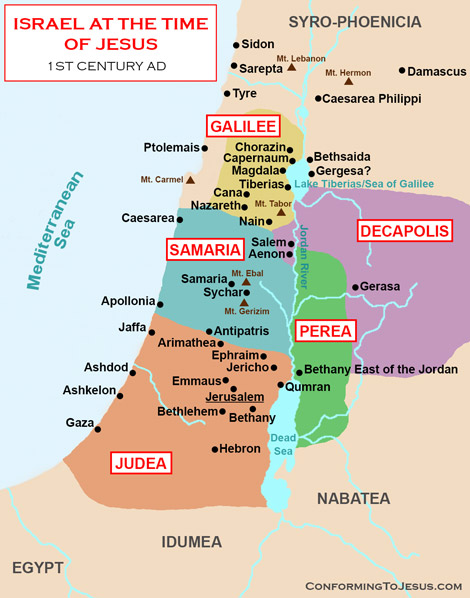Probably every Christian with any history of reading the Bible has heard the story of the woman at the well in John 4. And most Christians have also heard the phrase “the fields are white” (or ripe) “unto harvest.” Here’s something that caught my attention: That story and that phrase are intimately linked in a surprising way.
Here’s the setup: Near the beginning of His ministry, Jesus wanted to travel from Judea (in the southwest of Israel) to Galilee (in the northwest). Jesus chose a direct route through what is today part of the “West Bank”, which at the time was called Samaria. But normally a believing Jew would have avoided this area, suffering an extended detour to the east with two crossings of the Jordan River.

The Samaritans were an ethno-religious group that were descended directly from Abraham – from Joseph’s sons Ephraim and Manasseh – but who had intermarried with the Assyrians, and who followed a different religious tradition although still claiming to also worship Yahweh.
As such, they were not racially pure Jews, and the added religious issues led to real antagonistic racism between the two peoples. To the believing Jews, Samaritans were even worse than Gentiles.
So Jesus was, in a very real sense, entering a foreign land among a race that was hated by His people.
In this context, Jesus is briefly separated from His disciples, and stops to rest at a well on the outskirts of a town. Into this scene enters a woman with a very morally compromised life, and Jesus undertakes, of all things, a religious discussion with her. She is able to speak rather intelligently about the conflict between Jews and Samaritans.
Then the disciples return and find this rather surprising tableau: a respected Rabbi speaking with (gasp!) a solitary woman, (gasp!) a despised Gentile, and (gasp!) a person of rather ill repute.
Talk about the original intersectionality: a woman in a strongly patriarchal culture, racially oppressed, and living in sin with a sordid history of infidelity. The deck was truly stacked against her in the disciples’ eyes.
And there is Jesus, deeply engaged in religious dialog with this woman, who by all Jewish rights was in no position to challenge a Rabbi about religious matters.
Then the woman, who is so convicted and yet also encouraged by Jesus’ words, runs back into town to spread the Gospel of the Kingdom. And the result: 39 Now from that city many of the Samaritans believed in Him because of the word of the woman who testified, “He told me all the things that I have done.” 40 So when the Samaritans came to Jesus, they were asking Him to stay with them; and He stayed there two days. 41 Many more believed because of His word; 42 and they were saying to the woman, “It is no longer because of what you said that we believe, for we have heard for ourselves and know that this One truly is the Savior of the world.” (John 4:39-42 NASB)
Into the exact midst of this tableau, Jesus addresses the hearts of His disciples this way: 34 “My food,” said Jesus, “is to do the will of him who sent me and to finish his work. 35 Don’t you have a saying, ‘It’s still four months until harvest’? I tell you, open your eyes and look at the fields! They are ripe for harvest.“ (John 4:34-35 NASB).
Let’s tie this all together.
Jesus intentionally crosses into a racially-charged situation, deliberately engages with a triply-oppressed individual, doing so in a manner that scandalizes His own disciples, and in exactly that context He challenges His disciples to recognize that His sustenance comes from doing the will of the Father, and that they should open their eyes to see Samaria around them, that the people in that racially-outcast region were ripe for harvest. He then doubles down and stays to continue His ministry, and “many more” Gentiles believe, proving the truth of His words to His disciples.
Those verses were not written to just teach modern people about the general need to go make disciples, although that is the general interpretation in plenty of modern sermons.
Rather, I believe that His disciples would have clearly understood that Jesus in that moment was directly challenging their racist attitudes, and further challenging their notions about who was a suitable recipient of the Gospel. He chose one of the least desirable people in their view, who with just a few minutes of interaction was so convicted that many in the town were saved through her testimony and His ministry.
And a couple years later, as He was about to ascend into heaven, Jesus left His disciples with this charge: 8 “But you will receive power when the Holy Spirit has come upon you; and you shall be My witnesses both in Jerusalem and in all Judea, and Samaria, and as far as the remotest part of the earth.“ (Acts 1:8 NASB) This reinforced the idea that Samaria and the Gentiles and the remotest parts of the earth mattered to God as much as did the Jews.
Jesus’ closing words of His earthly ministry thus echoed the very beginning: That the disciples ought to pay close attention to building a multi-ethnic Kingdom.
So the question I’m left wondering: who qualifies as a Samaritan woman of ill repute in my mind? Who would Jesus choose to engage with, and then turn to me and say “Lift up your eyes – do you see the harvest here just waiting for you to participate? By her testimony many will come to Christ.”
I don’t want to miss that opportunity.
